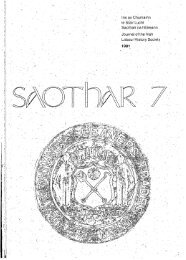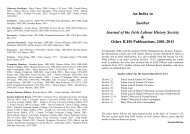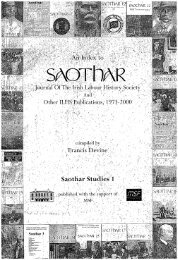Create successful ePaper yourself
Turn your PDF publications into a flip-book with our unique Google optimized e-Paper software.
EDITORIAL 3freedom to participate in decisions for change that can make the present the past·. The past itself mustnot be allowed fall prey to commercial, trivial or other forces that will strip it of the necessary cuttingedge that should remind all who witness it, whether in museum fOIll) or in the written word, that virtuallyall significant freedoms of today were the p~ciductof struggle engaged in byordinary women and men.The relevance of labourhistory today has never been more apt as history is surely repeatingitself in aregressive and repressive way.1913, being celebrated or commemorated after seventy five years, is not simply a window on timespast but a valuable base from which to question the present. It is, after all, a present again dominatedby unemployment, unequal opportunity, poverty and emigration. History should assist us in the processof identifying the reasons for the apparent lack of real progress and identify the enemies of today, bethey personalities, attitudes or ideologies, just as we readily identify William Martin Murphy, narrowselfish capitalism and an unsympathetic, stultifying ch urch in 1913. Labour history m useums shouldnot serve as monuments or mausoleums but as resource centres and reference points for contemporarysociety that cannot aspire to call itself civilised until the fears and want of so many are tackled andassuaged. The past is not romantic nor irrelevant. The past was too often sorry, grinding and pathetic.We should learn from it in order to prevent its repetition.Francis Devine and Emmet O'ConnorCumann Oibrighthe na hEireannFEDERATED WORKERS'UNION <strong>OF</strong> IRELANDThe Federated Workers IUnion of Ireland supportthe Irish Labour HistorySociety in their task of uncoveringthe history of the·working people of Ireland intheir struggle for a societyfree from exploitation.Enquiries to: The General Secretary,29/30 Pamell Square, Dublin1. Telephone: (01-)748711 and786866 (10 lines)





